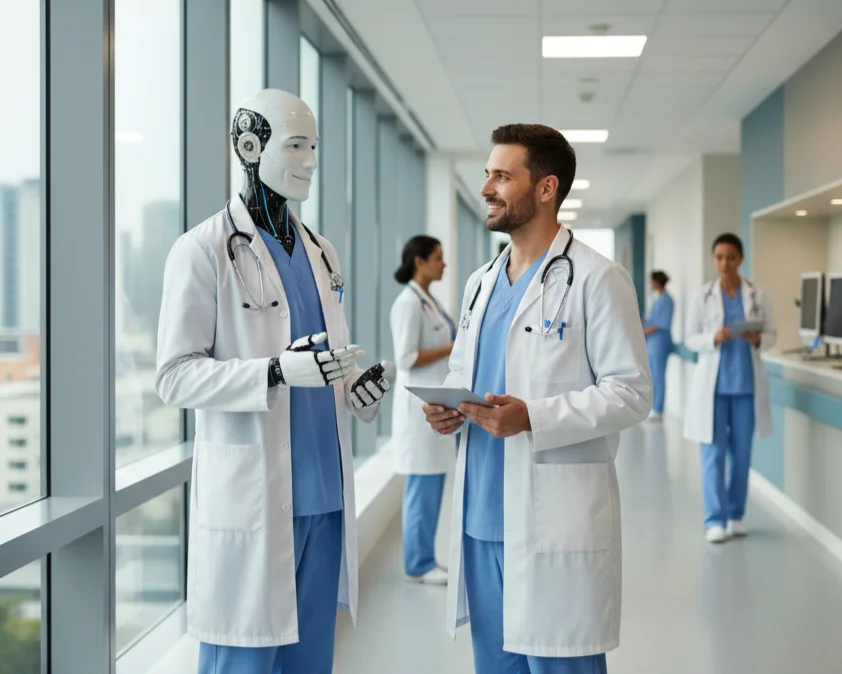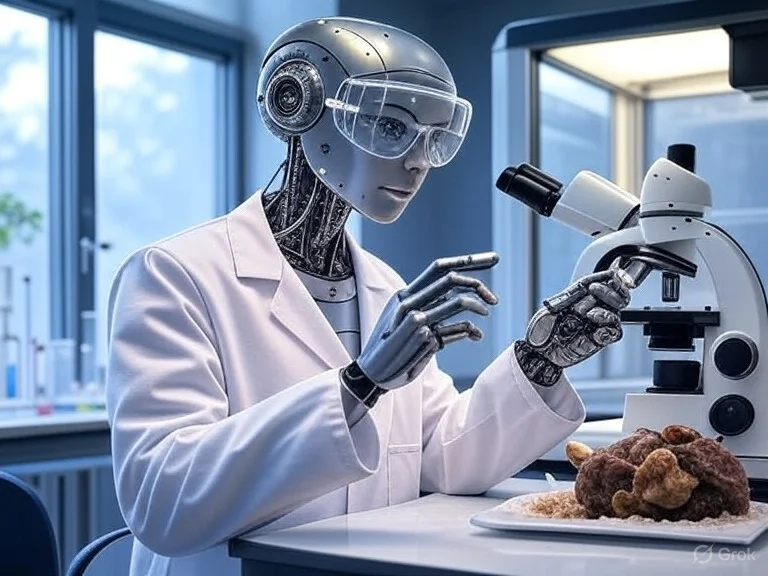The AI Revolution in Healthcare: Why AI is the Indispensable Ally of Medical Futures
Imagine a world where a simple scan from your smartphone detects cancer in its early stages, before you even feel a symptom. Or where a surgical robot, guided by infallible algorithms, performs a complex operation with Swiss-watch precision, while the surgeon supervises from thousands of miles away. This isn’t science fiction; it’s the reality that artificial intelligence (AI) is forging in healthcare. In a sector overwhelmed by staff shortages, aging populations, and an explosion of medical data, AI emerges not as a threat, but as the catalyst that could save millions of lives and billions of dollars. But why is this technology so crucial? In this article, we’ll explore the importance of AI in healthcare, from its everyday applications to the ethical challenges it presents, all with a focus on how it’s transforming—and will save—the global healthcare system.
As a journalist specializing in scientific breakthroughs, I’ve witnessed firsthand how AI moves from laboratories to operating rooms. At the Vall d’Hebron University Hospital in Barcelona, for instance, AI algorithms analyze CT scans in seconds, detecting anomalies that a human radiologist might take hours to identify. This isn’t just efficiency; it’s hope for patients who would otherwise face late diagnoses. But let’s take it step by step: what makes AI so vital in a field as human as medicine?
The Birth of an Alliance: The Historical Evolution of AI in Health
The story of AI in healthcare doesn’t begin with chatbots or robots; its roots sink back to the 1950s when Alan Turing dreamed of machines that could “think.” However, it was in the 1970s that medical AI took its first tentative steps. Programs like MYCIN, an expert system that diagnosed bacterial infections with 69% accuracy—better than the 60% of human doctors at the time—marked the beginning. It was a rudimentary prototype, but it demonstrated the potential: processing massive data to support clinical decisions.
Fast forward to the 21st century. The explosion of big data and machine learning has catapulted AI to center stage. In 2011, IBM Watson Health revolutionized oncology by analyzing millions of pages of medical literature to recommend personalized treatments. Today, with the rise of generative AI like GPT-4, we are in an era of “explainable AI,” where algorithms not only predict but also justify their conclusions. According to a report from the Harvard School of Public Health, AI could reduce treatment costs by 50% solely through diagnostics. The reason for its importance? In a post-pandemic world, where COVID-19 exposed the cracks in the healthcare system—endless emergency room queues and diagnostic errors that cost lives—AI offers scalability. It doesn’t tire, it doesn’t discriminate based on fatigue, and it learns from every mistake.
But it’s not all glorious history. Remember the Theranos case in 2015: a scam that promised miraculous AI-driven diagnostics but collapsed due to fraud. Lessons like this underscore that AI isn’t magic; it’s a tool that amplifies human ingenuity. Its true importance lies in democratizing access to healthcare: in underdeveloped regions, where there’s one doctor for every 10,000 inhabitants, AI via mobile apps can triage patients and prioritize emergencies.
Practical Applications: How AI is Rewriting the Medical Playbook
If AI is the engine, applications are the fuel driving healthcare forward. Let’s break them down, with real-world examples that will leave you in awe.
Assisted Diagnosis: The Eye That Never Sleeps
Diagnosis is the heart of medicine, and this is where AI shines brightly. Imagine a radiologist overwhelmed by 200 CT scans daily; AI processes them in minutes, detecting lung cancer with 94% accuracy, outperforming the human eye by 11%. At the Reina Sofía Hospital in Córdoba, Spain, R-language-based algorithms automate COVID-19 isolation reports, reducing human errors by 99%.
Another stellar case: Philips’ system in European hospitals, which uses AI to predict patient flows and allocate ICU beds. In one study, this reduced postoperative adverse events by 35% and cardiac arrests by 86%. Entertaining? Consider University College Hospital London: its AI reduced emergency wait times from an hour, freeing up staff for critical cases. It’s not just data; it’s lives saved in real-time.

Personalized Treatments: Medicine Tailored to You
Goodbye to “one-size-fits-all.” AI analyzes genomes, medical histories, and lifestyles to design unique therapies. In oncology, tools like IBM Watson recommend chemotherapies based on specific genetic mutations, increasing survival rates by 20%. At the Fundación Jiménez Díaz Hospital in Madrid, AI monitors hip prosthetic infections with 99.98% negative predictive accuracy, enabling safer surgeries.
And let’s not forget robotics: the Da Vinci robot, powered by AI, performs hysterectomies with minimal incisions, reducing recovery from weeks to days. In Spain, the PHASE-IV-AI project is testing AI in prostate cancer and strokes, generating synthetic data for more ethical and faster clinical trials. It’s like having a genetic tailor: each treatment, a custom-made garment.
Hospital Management: The Invisible Brain
Hospitals are organized chaos; AI turns it into a symphony. At the Virgen de la Victoria Hospital in Malaga, the Galen system uses AI to detect cyberattacks in real-time, protecting sensitive data. Better Care’s BC Link integrates ICU data—one gigabyte per patient per day—to predict critical events, freeing doctors from paperwork and giving them more time with patients.
In Madrid, an AI network centralizes radiological images across hospitals, streamlining consultations. The result: lower costs (up to 50% in patient care) and increased efficiency.
The Benefits: Efficiency, Precision, and Universal Access
Why invest in AI? The numbers speak volumes: it reduces medical errors—the third leading cause of death in the US, with 5 million annually—by 30-50%. It improves diagnoses in diabetic retinopathy and tuberculosis with superhuman accuracy. It personalizes treatments, saving resources: a McKinsey study estimates $150 billion annually in global savings.
Entertainingly, imagine a doctor freed from forms: their patient interaction time jumps from 12% to 50%. In public health, it predicts epidemic outbreaks, as it did with Ebola in Africa. Access: AI apps on smartphones save lives in rural areas.
| Benefit | Estimated Impact | Real-World Example |
|---|---|---|
| Diagnostic Accuracy | +20-30% | Lung cancer detection (Vall d’Hebron) |
| Cost Reduction | -50% | Personalized treatments (Harvard) |
| Administrative Efficiency | +40% clinical time | Report automation (Reina Sofía) |
| Event Prediction | -86% cardiac arrests | Philips in EU hospitals |
The Challenges: Ethics, Biases, and the Dark Side of AI
It’s not all rainbows. AI poses ethical dilemmas we cannot ignore. First, privacy: medical data is gold, but vulnerable. UNESCO warns of biases in algorithms trained on non-diverse data, which discriminate against ethnic minorities in diagnoses. The WHO alerts: biased data generates inaccurate information, risking lives.
Transparency is key: how do you explain a “black box” diagnosis? In Spain, the Roche Institute emphasizes rights over data and equity. Regulations like the EU’s AI Act seek to balance innovation and protection, requiring “high-risk AI” in health to undergo audits. The challenge: implement without stifling progress. As one expert puts it: “AI is a mirror; it reflects our biases if we don’t correct them.”
Towards the Horizon: The Future of AI in Healthcare
Look towards 2030: AI in wearables predicts heart attacks via pulses; AI-guided nanobots deliver drugs directly to tumors. Google Cloud envisions total precision medicine, with personalized genetic treatments. In Spain, the Basque Country’s AI plan in healthcare predicts cyberattacks and optimizes resources.
The World Economic Forum foresees AI transforming six areas: from fracture detection to patient triage. In radiology, RamSoft integrates AI for predictive workflows. The future: collaborative, with AI as a co-pilot, not the pilot.
Conclusion: Embrace AI, Embrace the Future
The importance of AI in healthcare isn’t abstract; it’s tangible in every life saved, every error averted. From precise diagnoses to ethical treatments, this technology promises a fairer, more efficient system. But its success depends on us: robust regulations, inclusive training, and a human-centered approach. As a journalist, I’ve seen AI move from promise to reality; now, it’s our turn to guide it. Are you ready for a world where health is intelligent? The future waits for no one.




6 thoughts on “AI in Healthcare: The Indispensable Medical Ally of the Future”